VIPsight - November 2011
COMPANIES
Metro leaderless
 Just over a week after the withdrawal announcement by Eckhard Cordes, Jürgen Kluge also announced his farewell to Metro. With his retirement, he wanted to ensure that the substantive work at the top of the retail group came back to the forefront. After the disputes over the leadership, it was time for a fresh start, said the manager. The Supervisory Board chairman remains CEO of Haniel, however. Since the CEO’s withdrawal was preceded by months of toing and froing, the decision by Cordes not to renew his contract expiring in October was hardly surprising.
Just over a week after the withdrawal announcement by Eckhard Cordes, Jürgen Kluge also announced his farewell to Metro. With his retirement, he wanted to ensure that the substantive work at the top of the retail group came back to the forefront. After the disputes over the leadership, it was time for a fresh start, said the manager. The Supervisory Board chairman remains CEO of Haniel, however. Since the CEO’s withdrawal was preceded by months of toing and froing, the decision by Cordes not to renew his contract expiring in October was hardly surprising.
BMW and VW are vying for SGL Carbon
 BMW plans according to Der Spiegel to take a stake in SGL Carbon, to assist Susanne Klatten in the power struggle over the carbon firm. BMW’s major shareholder had increased her share to 29 percent by exercising a convertible bond through her investment company Skion, to keep Volkswagen in check. The amount of BMW’s participation is still open. The Wolfsburgers came into SGL Carbon in February at 8.18 percent. An extensive joint venture between the SGL Group and the Bavarian carmaker was also agreed upon.
BMW plans according to Der Spiegel to take a stake in SGL Carbon, to assist Susanne Klatten in the power struggle over the carbon firm. BMW’s major shareholder had increased her share to 29 percent by exercising a convertible bond through her investment company Skion, to keep Volkswagen in check. The amount of BMW’s participation is still open. The Wolfsburgers came into SGL Carbon in February at 8.18 percent. An extensive joint venture between the SGL Group and the Bavarian carmaker was also agreed upon.
Cromme can be re-elected
With last year’s “Lex Cromme”, Siemens had already created the precondition for Gerhard Cromme’s re-election to the Supervisory Board in January 2013. Until now the rule at the Munich-based company was that supervisors should leave their posts at 70. But since a charter amendment, largely unnoticed by the public, the Rules of Procedure say: “For election to the Board, in general only persons who are not older than 70 should be proposed.” Cromme reaches that age one month later. Under the previous rule, he would have had to resign after the shareholder meeting. Siemens declined to comment.
Are VW and Suzuki facing a divorce?
 Martin Winterkorn wants to create clear conditions in the partnership with Suzuki within the current year. The German carmaker was ready to again reach out to Suzuki. But returning the 20 percent share was out of the question, said Hans Demant on 20 October. After all, “Suzuki would complement the Volkswagen portfolio downwards excellently,” said the manager responsible for the co-operation. Demant also pointed out that the Wolfsburgers’ objectives in 2018 did not depend on the success or failure of cooperation with the Japanese. Suzuki should either clearly acknowledge the cooperation, not even two years old, or Volkswagen would cancel it, Wirtschaftwoche reported on 22 October.
Martin Winterkorn wants to create clear conditions in the partnership with Suzuki within the current year. The German carmaker was ready to again reach out to Suzuki. But returning the 20 percent share was out of the question, said Hans Demant on 20 October. After all, “Suzuki would complement the Volkswagen portfolio downwards excellently,” said the manager responsible for the co-operation. Demant also pointed out that the Wolfsburgers’ objectives in 2018 did not depend on the success or failure of cooperation with the Japanese. Suzuki should either clearly acknowledge the cooperation, not even two years old, or Volkswagen would cancel it, Wirtschaftwoche reported on 22 October.
Buhlmann's Corner
Who knows Willy Brandt?
 He was a staunch socialist, and persecuted, and is now being outdone by the first German female chancellor – the first woman to set about “testing the resilience of the economy”. The first lady Chancellor is going even further than her socialist predecessor. Outside Germany, people think it’s only in a country like Germany that one can avoid being utterly confused by the vagaries of energy policy. But the game is not over yet.
He was a staunch socialist, and persecuted, and is now being outdone by the first German female chancellor – the first woman to set about “testing the resilience of the economy”. The first lady Chancellor is going even further than her socialist predecessor. Outside Germany, people think it’s only in a country like Germany that one can avoid being utterly confused by the vagaries of energy policy. But the game is not over yet.
The politicians’ latest tactic is forcing equity capital on the banks. Especially the “good” bankers must respond by shrinking the balance-sheet and raising the book profits – in the interest of the shareholder, there is no alternative. That’s not wise either for the bank or for the national economy. Whoever acts fastest will be safe from the rating agencies. Because before they can manage to act, the mobile (or rather, still moving) banker will have left the scene again. Really only one thing is clear: anyone who’s naive enough to really think that systemic trust in the financial market can be produced by increasing the accounting equity ratio a few percentage points without at least equal financial discipline is going to lose those same percentage points in intelligent voters.
Today the rankings listers are still going after individual States, and almost no one asks about their ownership structures. Those are the agencies whose regulation is always being called for, and always with the same lack of consequences. The agencies that would, if one had followed their assessments for investment purposes over the past decade, have destroyed more billions than they would have protected. The agencies that earn just as much from the downfall of their customers as from the contractual fees of those that depend on them. But anyone thinking of imperiously forbidding the raters should consistently also ban similar irresponsibility of governments and regulators, or the scoring of retail borrowers. To paraphrase the French Sun King Louis XIV, “LEtat, c’est moi.”
But back to energy: first a tax bringing in hundreds of millions a year is invented, and then its equivalent, or much more, is destroyed. The primacy of politics is clear and unquestioned. But the costs of decisions should be paid by the decision-makers. Anything else is the beginning of the end, like the financial crisis that we in Germany have often referred to as, and continue to call, a crisis of confidence. When are the shareholders going to call in the values? Where is the faithful trustee who truly protects the assets of his investing retirees and retail customers instead of only managing political decisions that are irresponsible because they have no consequences?
It’s still the Wall Street banks that are occupied; some day it’ll be the Frankfurt banking district, and finally the whole system will be called into question. Between capitalism and communism, there is a range – also known as the German way, with social peace, participation and the economic miracle. If, however, politics is ruled by the pendulum of the street, then the only recourse is Black & White – or even better, a well-matured Laphroaig!
ACTIONS CORNER
The criminal trial of Rolf Breuer postponed in mid August is to start on 24 November. The former Deutsche Bank CEO and Supervisory Board chair has to answer before Munich District Court I for attempted fraud in a civil trial dealing with Leo Kirch’s bankruptcy, the Court announced on 5 October. Breuer, according to the prosecutors, deliberately made false statements in court in 2003. The first edition of the proceedings had been suspended due to scheduling problems during the holiday season.
 The chamber of Munich Higher Regional Court found on 25 October, in the proceedings around multi-billion dollar damages for the collapse of the Kirch empire, that there is no evidence of collusion by Breuer with Bloomberg TV. Even though there is still no verdict in sight, the Deutsche Bank is unwilling to settle out of court. The former Deutsche Bank chief had questioned the creditworthiness of the Kirch Group in the much-noted interview. He later described his statements as an accident.
The chamber of Munich Higher Regional Court found on 25 October, in the proceedings around multi-billion dollar damages for the collapse of the Kirch empire, that there is no evidence of collusion by Breuer with Bloomberg TV. Even though there is still no verdict in sight, the Deutsche Bank is unwilling to settle out of court. The former Deutsche Bank chief had questioned the creditworthiness of the Kirch Group in the much-noted interview. He later described his statements as an accident.
A lawsuit has been filed in the U.S. against Deutsche Bank in connection with the subprime crisis. The complaint relates to the purchase of CDOs valued at $440 million in 2005 and 2007. The Bank considers the action to be unfounded and will fight back with all legal means.
 Bonn public prosecutors are investigating Deutsche Telekom again on suspicion of commercial fraud. According to Handelsblatt, the background is a denunciation by Telegate founders Klaus Harisch and Peter Wünsch. The DAX-listed company believes the criminal charges levied are “entirely without merit” and will challenge the prosecutors’ position. The proceedings once again relate to the charge that the Bonn-based company charged inter alia Telegate abusively excessive amounts for data on all names and numbers. In 2011, according to Handelsblatt, Telekom lost 22 cases, amounting to more than €100 million plus lawyers’ fees.
Bonn public prosecutors are investigating Deutsche Telekom again on suspicion of commercial fraud. According to Handelsblatt, the background is a denunciation by Telegate founders Klaus Harisch and Peter Wünsch. The DAX-listed company believes the criminal charges levied are “entirely without merit” and will challenge the prosecutors’ position. The proceedings once again relate to the charge that the Bonn-based company charged inter alia Telegate abusively excessive amounts for data on all names and numbers. In 2011, according to Handelsblatt, Telekom lost 22 cases, amounting to more than €100 million plus lawyers’ fees.
 According to the Financial Supervisory Authority BaFin, the suspicion of insider trading at GAGFAH has been confirmed. The authority’s formal investigations were completed in late August and the 50-page report forwarded to Düsseldorf prosecutors, it was announced on 6 October. They subsequently opened proceedings. According to the prosecutors a total of five persons are accused. William Brennan had sold shares in the real-estate group in early February for €4.7 million.
According to the Financial Supervisory Authority BaFin, the suspicion of insider trading at GAGFAH has been confirmed. The authority’s formal investigations were completed in late August and the 50-page report forwarded to Düsseldorf prosecutors, it was announced on 6 October. They subsequently opened proceedings. According to the prosecutors a total of five persons are accused. William Brennan had sold shares in the real-estate group in early February for €4.7 million.
Ingolstadt District Court has confirmed that the setting up of an advisory board at Media-Saturn-Holding by METRO was legal. The majority owner must however accept Erich Kellerhals’s blocking minority on most major decisions. The majority owner had wanted to overturn this and argued that the board could decide by simple majority. So far, decisions must be taken at the shareholders’ meeting at Media-Saturn, by an 80 percent majority. The retail group will now examine the judge’s decision.
On 19 October the U.S. subsidiary of SolarWorld, together with the Coalition for American Solar Manufacturing consisting of six other U.S. solar companies, filed a petition with the U.S. Department of Commerce and the International Trade Commission, the ITC. In the statement the association, founded by the German solar producer, claims that Chinese companies have received numerous illegal subsidies from the Chinese government. Solar World is now considering proceeding against dumping prices from China in the European Union too.
 A 1.1 billion-dollar claim for damages by 41 investors (mainly fund companies) against Porsche and Volkswagen has officially arrived at Braunschweig District Court. The CLLB law firm had been polishing its case against the two carmakers for two and a half years. It is apparently also one of the triggers for Volkswagen’s statement on 8 September that the merger with Porsche will no longer take place this year. The Munich lawyers assume that the damage claim will grow further. With the takeover battle, price turbulence is said to have cost investors millions.
A 1.1 billion-dollar claim for damages by 41 investors (mainly fund companies) against Porsche and Volkswagen has officially arrived at Braunschweig District Court. The CLLB law firm had been polishing its case against the two carmakers for two and a half years. It is apparently also one of the triggers for Volkswagen’s statement on 8 September that the merger with Porsche will no longer take place this year. The Munich lawyers assume that the damage claim will grow further. With the takeover battle, price turbulence is said to have cost investors millions.
AGM Dates
Politics
DCGK to be brought in line?
 The tasks and composition of the Government Commission on the German Corporate Governance Code (DCGK) are to be enshrined in the Companies Act, according to FAZ. The CDU Federal Committee on Economic, Fiscal and Financial Policies complains that the panel’s existing freedom of content is constitutionally questionable, and also that its formulations give too little consideration to small, medium and family companies. In addition, the Code reflects applicable legal rules inadequately.
The tasks and composition of the Government Commission on the German Corporate Governance Code (DCGK) are to be enshrined in the Companies Act, according to FAZ. The CDU Federal Committee on Economic, Fiscal and Financial Policies complains that the panel’s existing freedom of content is constitutionally questionable, and also that its formulations give too little consideration to small, medium and family companies. In addition, the Code reflects applicable legal rules inadequately.
Resistance to new BaFin chief
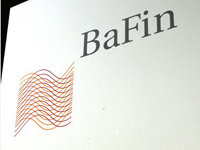 The change in leadership at the Federal Supervisory Office for Financial Services (BaFin) has been delayed. The nomination of Elke König as new president of the German financial supervisory authority is meeting with opposition in government circles. König is currently a member of the London International Accounting Standards Board, and the Federal Treasury wants her as head of BaFin. It is alleged that high-ranking senior officials have spoken internally against the appointment of the budget expert. Jochen Sanio’s successor, she is to be paid much better, at about €230,000, and with her the other members of the five-member board. The Bundestag must provide for the legal requirements before the Ministry can meet the salary demands of this candidate without official status.
The change in leadership at the Federal Supervisory Office for Financial Services (BaFin) has been delayed. The nomination of Elke König as new president of the German financial supervisory authority is meeting with opposition in government circles. König is currently a member of the London International Accounting Standards Board, and the Federal Treasury wants her as head of BaFin. It is alleged that high-ranking senior officials have spoken internally against the appointment of the budget expert. Jochen Sanio’s successor, she is to be paid much better, at about €230,000, and with her the other members of the five-member board. The Bundestag must provide for the legal requirements before the Ministry can meet the salary demands of this candidate without official status.
CDU ministers divided over women’s quota
The 30 most highly endowed listed companies introduced targets in mid-October for a voluntary commitment to expanding the proportion of women in their leadership positions “significantly” in coming years. Currently the women’s share of board positions is 3.7 percent. Now the companies are to report once a year on the number of men and women on management and supervisory boards. Family Minister Schröder welcomed the corporations’ self-set goals as major progress. Labour Minister Ursula von der Leyen (also CDU) in contrast feels that “we cannot continue at this snail’s pace here.” To her mind, there should in future be a 30-percent rule governing the minimum numbers of women and men on management and supervisory boards.
CSR reporting becoming mandatory
So far it is open to companies in Germany to speak in their annual reports on activities in environmental, cultural and social affairs. In France, however, companies have since 2001 had to submit a so-called Corporate Social Responsibility (CSR) report. In order to unify this Europe-wide, the European Commission now wants, according to Financial Times Deutschland, to present a legislative initiative in 2012 for more transparency in CSR. German companies and associations have so far defended themselves against a legal requirement at EU level with the argument that especially for small and medium-sized enterprises such an obligation only means more bureaucracy. Although the EU does not itself want to prescribe a commitment to CSR, it hopes the obligation to disclose these activities will move previously inactive companies towards greater commitment to CSR. Exceptions for small and medium-sized enterprises are possible here, the Commission said.
Raid because of interest agreements
In mid-October numerous European banks were raided, Financial Times Deutschland reported. It is suspected there was interest manipulation, said the EU’s competition watchdogs. The EU Commission left open which banks were under investigation. The Reuters news agency reported, however, that Deutsche Bank premises in London had also been searched. The allegation is that the banks had formed a market cartel in the Euribor interest rate. The Euribor (Euro Interbank Offered Rate) is an interbank interest rate which influences the cost of consumer and corporate loans. Already in March this year, there were similar suspicions about the so-called Libor (London Interbank Offered Rate). Both the Euribor and the Libor reflect the terms on which the banks lend money to each other for different periods. The Euribor combines data from 44 banks. The European Banking Federation, EBF, which fixes the Euribor daily, therefore regards manipulation as out of the question.
People
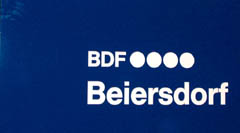 Thomas B. Quaas will be replaced after the AGM in April 2012 and is subsequently to be voted onto the Supervisory Board. The Supervisory Board of Beiersdorf has nominated Stefan F. Heidenreich to succeed the current CEO. Heidenreich is moving in early 2012 from the Hero Group to the Hamburg cosmetic company to “implement the corporate strategy further”.
Thomas B. Quaas will be replaced after the AGM in April 2012 and is subsequently to be voted onto the Supervisory Board. The Supervisory Board of Beiersdorf has nominated Stefan F. Heidenreich to succeed the current CEO. Heidenreich is moving in early 2012 from the Hero Group to the Hamburg cosmetic company to “implement the corporate strategy further”.
Christian Holzherr will leave Celesio on 30 November. The CFO’s contract would have run until the end of April 2013. Michael Lonsert is also leaving the company, on 31 December. Thus the company, controlled by the Haniel Group of Duisburg, is already losing its second and third top executive, after the departure of Fritz Oesterle at the end of June.
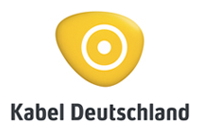 After selling the last of its shares in July, Providence is to withdraw from the board of Kabel Deutschland Holding (KDG), the company announced on 13 October at its general meeting. The three representatives of the Americans laid down their mandates at the end of October. In addition to John Hahn, Biswajit Subramanian and Robert Sudo, Supervisory Board member Ian West also left. The successors are economics professor Annet Aris, media manager and former MTV Europe boss Catherine Mühlemann, IT manager Paul Stodden and financial expert Torsten Winkler. The candidates were initially court-appointed; however, their election should come at the shareholder meeting next year. With the departure of the private-equity firm, KDG is 100 percent free float.
After selling the last of its shares in July, Providence is to withdraw from the board of Kabel Deutschland Holding (KDG), the company announced on 13 October at its general meeting. The three representatives of the Americans laid down their mandates at the end of October. In addition to John Hahn, Biswajit Subramanian and Robert Sudo, Supervisory Board member Ian West also left. The successors are economics professor Annet Aris, media manager and former MTV Europe boss Catherine Mühlemann, IT manager Paul Stodden and financial expert Torsten Winkler. The candidates were initially court-appointed; however, their election should come at the shareholder meeting next year. With the departure of the private-equity firm, KDG is 100 percent free float.
Linde is taking its new Director for North and South American operations from Siemens. Thomas Blades was appointed as the fourth Supervisory Board member, to succeed Kent Masters, the industrial-gases company announced on 30 September in Munich. The Briton will take up his duties by 1 April 2012, Linde also announced. He was most recently CEO of the oil and gas division at Siemens.
Eckhard Cordes wants to give up his position at METRO. The chief executive of the retail giant announced on 9 October that he was no longer available for a renewal of his current contract, expiring on 31 October 2012. Professor Jürgen Kluge also resigned his post of Supervisory Board chairman at the retail group on 2 November. Instead, Franz Markus Haniel is to move to the Supervisory Board.
Supervisory Board evaluation - a question of style or an EU joke?
H.L. HENNER KLEIN, LABBÉ & CIE.*
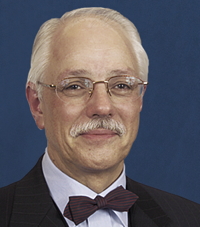 After Sarbanes-Oxley in the US, the Combined Code on Corporate Governance in the UK and recently the German Corporate Governance Code in Germany, the EU too (no surprise) has now again set about laying down more, and more closely defined, rules in terms of integrated business management. Already in 2005 the Commission had recommended that supervisory boards of listed companies each year undertake a self-assessment. Not only their composition, organization and functioning as a group should be assessed, but also the competence and performance of individual members and of the committees. Overall performance should also be rated against the performance targets. The regular use of an external "facilitator" could also improve assessment of the board, by providing an objective point of view and sharing good practices of other companies. In its recent Green Paper, the EU put the icing on the cake by suggesting that regular external assessment be prescribed as a requirement. Jubilation broke out, at least in the consulting industry, with many self-proclaimed experts scenting a new lucrative business field, before the compliance bureaucracy has reached its peak.
After Sarbanes-Oxley in the US, the Combined Code on Corporate Governance in the UK and recently the German Corporate Governance Code in Germany, the EU too (no surprise) has now again set about laying down more, and more closely defined, rules in terms of integrated business management. Already in 2005 the Commission had recommended that supervisory boards of listed companies each year undertake a self-assessment. Not only their composition, organization and functioning as a group should be assessed, but also the competence and performance of individual members and of the committees. Overall performance should also be rated against the performance targets. The regular use of an external "facilitator" could also improve assessment of the board, by providing an objective point of view and sharing good practices of other companies. In its recent Green Paper, the EU put the icing on the cake by suggesting that regular external assessment be prescribed as a requirement. Jubilation broke out, at least in the consulting industry, with many self-proclaimed experts scenting a new lucrative business field, before the compliance bureaucracy has reached its peak.
To immediately proceed to one conclusion: a periodic review of the quality of the work of the Supervisory Board and Advisory Board is actually so self-evident that one wonders why business and industry are not addressing this much more actively, rather than letting more paternalism of government regulation and bureaucratic requirements be imposed on them. The effect of any corporate-governance system is first and foremost a question of effectiveness and efficiency of the managerial bodies acting, i.e. of, respectively, the Board, Management and Supervisory Board, and Advisory Board if any. But all the governing bodies display more complex leadership mechanisms than commonly supposed. The Institute of Directors (UK) rightly notes: to gather a group of competent people of goodwill around a conference table does not guarantee an efficient nor an effective job. Here qualitative conditions - often denoted by the term culture - play the really decisive role. Formal structures, processes and regulations are undoubtedly important, and promote efficiency. But a discussion culture characterized by mutual respect, trust, openness and joint commitment to the good of the company will remain the sufficient condition for real effectiveness.
Therefore, the question of the evaluation of supervisory bodies is not really an if, but a how: internal or external evaluation? Formal or more informal? Regularly or rather when needed? One conclusion is certain: a standard solution that takes away the need for thought and discernment by managerial people is not going to happen. Government agencies must set conditions which make abuse difficult, and if it happens, provide a framework to better establish responsibility. This is to be honoured, and is in principle in the interests of shareholders, partners and employees. But the firm and its owners must be left sufficient freedom to shape the how in terms of their own corporate responsibility.
A responsible supervisory or advisory board (and much the same applies equally to board and management) should subject its own work regularly to critical review. A procedure internal to the bodies is recommended at the beginning, especially for smaller bodies, and is quite sufficient. Correctly, in a first step the more formal forms will in any case be to the fore. This can be by questionnaire or by direct discussions conducted by the supervisory-board or advisory-board chairman or - especially in family and other small businesses - by a non-participating partner. The integration of company-external support should at this scale be reserved for a second step, in order to take on a moderator role in full objectivity if follow-on steps are necessary. For larger and co-determined supervisory boards, external support appears basically sensible for various reasons and because of the overall more complex mixed situation. This may relate to specific vulnerabilities or be because of general lack of progress towards the elimination of discovered shortcomings. In any case, not knowledge but change is the challenge.
The involvement of a selected external expert is recommended mostly for the elimination of "climate" problems, but also for strategically relevant factual issues argued over for a long time without achieving substantial consensus. A clever approach to evaluating a supervisory board is to hold a board strategy meeting moderated by experienced consultants. In a two-day session the object here is to subject the company's strategy, its business model and the question of the actual value creation in each value chain to a consistent plausibility check, and at least scrutinize existing assumptions on the basis of foreseeable trends in the industry. Last but not least, the question of reasonable executive compensation can be taken only once the strategic parameters on the basis of which the success criteria for each Board position are defined have been understood and agreed to. Supervisory evaluation in this sense then reveals not only procedural potentials, but also content that describes the actual lever for efficient and effective supervisory work. As always, what is essential gains from conciseness.
* H.L. HENNER KLEIN is a shareholder and partner of LABBÉ & CIE. (www.labbe-cie.eu), a Leadership Boutique specializing in supervisory and advisory board services, as well as Top Executive Search & Advisory.
“Our users are setting micro trends”
Interview with Jonathan Assia, CEO of eToro, one of the world’s biggest investor portals*
Mr. Assia, what is eToro?
Assia: We began in 2007 with the aim of simplifying and democratizing foreign-exchange and commodities trading. I started trading on the stock exchange at 16 already, something too complicated at the time for ordinary people due to incomprehensible systems. The vision of my brother and me was to make global markets accessible to everyone and at the same time increase the fun factor in trading. Our open online trading platform OpenBook allows any novice to enter foreign-exchange, commodities and index trading on a beginner’s account with virtual credit. He can not only see and follow other users’ deals, but also chat with them about their strategies. We believe that dealers should exchange ideas in order to get a really clear picture of the market. In our open-book mode, all transactions can be followed transparently on a live ticker track. In this way, all users get a picture of who acted when and how. The big asset is that experienced traders disclose their knowledge and their individual trading strategies and share them with a large community. As the world’s largest investment network, we make “insider knowledge” transparent.
How many users take advantage of your offer?
Assia: We currently have 1.75 million users. Some 70,000 members are actively trading on eToro. Our 400 or so “gurus”, as we call the experienced traders, act as models for the ordinary users.
How does someone become an eToro guru and why does he expose his trades?
Assia: The guru wants to share his trading experiences with others, discuss them and reap praise and admiration for successful deals. The aim of our traders is not only to make money but also to be more successful than other dealers. Every eToro deal is documented, and a trader’s success, his risk strategy and his trading portfolio can be tracked in our ranking. The more successful a trader, the greater the interest of other users in his strategy. The pivotal point of eToro is that every user can follow successful traders - can “become a follower”.
Can the user copy the strategy?
Assia: With a single click. All deals by the model can be automatically executed by the follower too in real time - at the same prices as the guru. With this lean-back principle, an average user can therefore rely on the expertise of experienced eToro traders and trade successfully without much effort. The asset for experienced traders is that they rise higher in the ranking the more followers they have. We call this the “social indicator”, which is in turn critical to our traders’ ranking in OpenBook. In addition to this social recognition weekly bonuses also attract the gurus.
Among them there are certainly some pros?
Assia: Yes, with our Copy.Me module experienced traders can turn professional and set up their own investment shop. They are certified by us, and must show trading successes, a minimum number of trades and followers or a securities trading certificate. By the end of the year we expect 50 to 100 professional traders on our platform.
Does a follower not make himself dependent on a single opinion with a copy function?
Assia: To diversify investments, a user cannot copy an experienced trader with more than 20 percent of his total investment. A maximum of ten traders can follow a user. Traders can also copy one another. Although no ‘black boxes’ are possible. Here what counts is who followed whom first. In the event that an experienced trader makes a deal the follower does not want to copy, a transaction can be stopped and the copy relationship dissolved at any time. In this respect our system is self-regulatory: if you don’t perform, then no one follows you and you fall out of the top ranking. Technically, our customers can trade either using the WebTrader or on their mobile smartphone.
What is the cost of trading on eToro?
Assia: Our customers do not pay registration fees. We finance ourselves as brokers on the spread of currencies and therefore profit from the deals done. Currently we are seeing around 40,000 trades a day.
Is the eToro community more successful than an individual acting alone?
Assia: Often enough our users set micro trends that can then benefit the entire community. The secret of success here is that every individual has experience or special knowledge which the entire community benefits from. For example, when the great earthquake shook northeastern Japan, even before the first press releases swarm-like movements were observed in our traders in Japan. In sum, we’ve seen here the mass is more intelligent than the individual. Yaniv Altshuler of the Massachusetts Institute of Technology (MIT) is currently investigating how information in social networks influences social processes and economic outcomes. The study examines the extent to which social networks act as a filter and allow the dissemination of valuable information only. We are particularly interested here in the relationship between trading in open networks (Social Trading) and the success of the trading results. We also publish market analyses weekly and follow our users’ trends.
What are your future plans?
Assia: We plan to expand our trading service to selected stocks. Germany belongs here with Italy and Britain to the top five of our largest markets. In Germany we already have some 150,000 users. On the technical side, we are thinking about using our users’ “bad trades” to develop a tool for an anti-strategy. Naturally, increased cooperation with other social networks like Facebook or Twitter is also a big issue for us.
* interview conducted by Insight journalists Christiane Süssel and Michael Garth
Campus
More professionalism in supervision
 According to the new study of Supervisory Boards by shareholder association Deutsche Schutzvereinigung für Wertpapierbesitz (DSW), the importance of company supervisors but also the demands on them are increasing. According to a points ranking, Manfred Schneider, chairman of Bayer, RWE and Linde, is regarded as the most powerful Supervisory Board member in the DAX, MDAX and TECDAX, followed by Gerhard Cromme and Clemens Börsig. Renate Köcher is the first woman, in 29th place. With an annual income of €1.1 million Schneider is also the top earner among German supervisors, followed by Cromme (0.92 million euros) and Ferdinand Piëch (0.84 million euros). Overall, the DAX companies paid their Supervisory Board members around 64.7 million euros in 2010, 26 percent more than last year. On average, a Supervisory Board chairman earned €273,000 last year. After Allianz, E.ON and Siemens eliminated the variable portion of their Supervisory Board members’ remuneration, for the other DAX companies the long-term variable share also plays an increasingly smaller role. DSW welcomes this, as it made little sense to have Supervisory Board members participate in economic success or failure like board members. Of the 256 seats 71 (28 percent) were held by foreigners. Only 28 seats (16 percent) are occupied by women.
According to the new study of Supervisory Boards by shareholder association Deutsche Schutzvereinigung für Wertpapierbesitz (DSW), the importance of company supervisors but also the demands on them are increasing. According to a points ranking, Manfred Schneider, chairman of Bayer, RWE and Linde, is regarded as the most powerful Supervisory Board member in the DAX, MDAX and TECDAX, followed by Gerhard Cromme and Clemens Börsig. Renate Köcher is the first woman, in 29th place. With an annual income of €1.1 million Schneider is also the top earner among German supervisors, followed by Cromme (0.92 million euros) and Ferdinand Piëch (0.84 million euros). Overall, the DAX companies paid their Supervisory Board members around 64.7 million euros in 2010, 26 percent more than last year. On average, a Supervisory Board chairman earned €273,000 last year. After Allianz, E.ON and Siemens eliminated the variable portion of their Supervisory Board members’ remuneration, for the other DAX companies the long-term variable share also plays an increasingly smaller role. DSW welcomes this, as it made little sense to have Supervisory Board members participate in economic success or failure like board members. Of the 256 seats 71 (28 percent) were held by foreigners. Only 28 seats (16 percent) are occupied by women.
Management reports too thin
Only about 60 percent of the DAX and MDAX companies report in their financial statements on the situation of the company or create a separate document for this purpose, says an analysis by Hamburg financial-communications agency IR-ONE. If there is a situation report, then its average length is two pages. Additionally, in the DAX 30 percent and in the MDAX 20 percent of companies use quarterly results in the annual report. Figures from the quarters are cited particularly commonly if they are subject to strong seasonal fluctuations, analysed IR-ONE.
Say on Pay becomes standard
 For the first time in 2010, all 30 DAX companies submitted their board members’ remuneration system to shareholders for a vote. In the MDAX at least 78 percent did, according to an analysis by German shareholder association Deutsche Schutzvereinigung für Wertpapierbesitz (DSW). While this “Say on Pay” in Germany, as in Britain, Spain and Portugal, is consultative and so not legally binding, usual disclosure practices vary widely throughout Europe, according to DSW partner organization Expert Corporate Governance Service (ECGS). While shareholders in Germany, Denmark, the Netherlands, Norway and other countries vote on remuneration policy and the remuneration system, those in Belgium and the UK have the remuneration report submitted to them. In the last reporting season it again became clear that the potential compensation is often too high, or variable components were not designed to be transparent enough. So it was often not possible to understand whether the principle of “pay for performance” was met or whether procedures were more on the principle of “reward for failure”. ECGS has set itself the goal of establishing universal standards for the disclosure of executive compensation.
For the first time in 2010, all 30 DAX companies submitted their board members’ remuneration system to shareholders for a vote. In the MDAX at least 78 percent did, according to an analysis by German shareholder association Deutsche Schutzvereinigung für Wertpapierbesitz (DSW). While this “Say on Pay” in Germany, as in Britain, Spain and Portugal, is consultative and so not legally binding, usual disclosure practices vary widely throughout Europe, according to DSW partner organization Expert Corporate Governance Service (ECGS). While shareholders in Germany, Denmark, the Netherlands, Norway and other countries vote on remuneration policy and the remuneration system, those in Belgium and the UK have the remuneration report submitted to them. In the last reporting season it again became clear that the potential compensation is often too high, or variable components were not designed to be transparent enough. So it was often not possible to understand whether the principle of “pay for performance” was met or whether procedures were more on the principle of “reward for failure”. ECGS has set itself the goal of establishing universal standards for the disclosure of executive compensation.
Supervisory Board members: excessive networking harms governance
The question of the role of Supervisory Board members as part of corporate management in relation to their involvement in social networks is the focus of the study “Is Busy Really Busy? Board Governance Revisited” by Professor Christian Andres of the WHU - Otto Beisheim Graduate School of Management and Mirco Lehmann of the University of Bonn. Here the scientists pursue the thesis that the sheer number of Supervisory Board posts held is not really an indication of the workload and the impact of Supervisory Board members. Based on an analysis of social networks (including personal contacts and memberships in associations and unions), the study shows that in the 133 German companies surveyed whose managers played a central role in the network in 2003-6, weaker governance was usually to be found. The pay of executives in companies with better-connected Supervisory Board members is consistently higher. The study comes to the conclusion that the limitation of Supervisory Board seats alone is no guarantee for better corporate governance, as long as here the scope and obligations of the mandates held are ignored. The complete study can be retrieved at http://ssrn.com/abstract=1569531.
Increasing number of professional plaintiffs
Frankfurt lawyer Professor Theodor Baums has determined that the number of legal challenges has been halved since the law was changed two years ago. Nevertheless, the reform has not worked adequately, according to Baums. The number of professional plaintiffs had according to his estimate risen from 32 to 45 in the past two years, and 80 percent of the actions for avoidance and nullity now focused on this group.
The most active professional plaintiffs
Name Actions Involvements Companies
brought as intervener sued
Klaus E. H. Zapf 74 8 44
Timo Hofmann 62 5 40
Thomas Höder 26 5 25
Familie Knoesel 22 0 19
Axel Sartingen 22 0 15
Caterina Steeg 21 0 19
Frank Scheunert 18 4 13
Peter Eck 17 1 11
Peter Zetzsche 16 0 15
Karl-Walter Freitag 14 8 9
Source: FAZ, after Baums/Drinhausen
Hedge funds improve corporate governance
Recent regulatory changes have meant that in German companies corporate governance will be exercised less and less by universal banks, and increasingly by other capital-market participants - including hedge funds. Has this trend towards a more capital-market orientation also improved corporate governance and shareholder value? This question is considered in the study “The Returns to Hedge Fund Activism in Germany” by Professor Wolfgang Bessler (University of Giessen), Professor Wolfgang Drobetz (University of Hamburg) and Julian Holler (University of Giessen). Between January 2000 and December 2006, the researchers examined 231 cases in Germany and were able to observe significant short-term price increases for the acquired companies as a result of hedge-fund activities. These positive effects, resulting partly from the fact that hedge funds often go into less profitable and badly managed companies, are still present after three years. The extent of long-term appreciation of these companies depends on one hand on their characteristics and ownership structures, and on the other on the hedge fund’s tactics and strategy. The complete study can be retrieved at http://www.fma.org/Denver/Papers/CorporateGovernanceHedgeFundsFMADenver.pdf. Advanced topics such as a consideration of the bear market from 2007 to 2008, which in contrast to the period 2000 to 2006 shows a negative performance of the target companies, are included in Julian Holler’s doctoral dissertation (to be published in January 2012 under the title “Hedge Funds: A Theoretical and Empirical Analysis from the Perspectives of Asset Management and Corporate Governance” in the Gabler Verlag series “Money – Banks – Exchanges”).
Supervisory Board members in a dilemma
Municipalities have, according to a ruling by the Federal Administrative Court (BVG) (AZ 8 C 16/10/2011), a right of instruction over Supervisory Board members sent by them to companies they have shares in, even without explicit provisions. In the case in point a city council had instructed the Supervisory Board members nominated by it not to agree to a price increase intended by an energy company. The decision runs counter to the company-law principle of independence of Supervisory Board members from instructions. In the opinion of lawyers, the Federal Court of Justice (BGH), responsible for company law, would have found no municipal authority to issue directives.
FIROs on the march
The German Investor Relations Association (DIRK), together with the Frankfurt School, has designed a training programme for FIROs - Fixed Income Investor Relations Officers. In a multi-day seminar, participants should develop basic knowledge of credit products and their legal aspects, receive an overview of Debt Capital Markets and processes, needs and requests for credit analysts and investors, and acquire an insight into the do's and don'ts of Fixed Income IR. The lecturers come from corporate and capital-market practice. The offer starts in 2012.
DWS checks auditors
“It is questionable when a company checks as part of its audit work something they have previously developed as a consulting company themselves,” complains Jella Benner-Heinacher, managing director of shareholder association Deutsche Schutzgemeinschaft für Wertpapierbesitz (DSW), on the premise of the independence of the big accounting firms. Together with the Expert Corporate Governance Service (ECGS), DSW put common practice in the industry under the microscope. The Big Four - PricewaterhouseCoopers, KPMG, Ernst & Young and Deloitte - were clearly an oligopoly and, according to ECGS Analysis 2010, together audit 93 percent of the 450 largest European companies. They collected four billion euros, while the other companies came to just 103.5 million euros. On average across Europe 72 percent of revenue was audit fees, an additional nine percent audit-related fees, and less than 19 percent non-audit fees. In Germany, the non-audit fees even reach 20 percent. At 13 million euros, the average remuneration of auditors in Germany ranks top in Europe. In 2010 Deutsche Bank was on top with audit fees of €71 million, followed by E.ON at €59 million and Siemens at €47 million. Another problem is that while the audit costs are indeed in the Annual Report, the explanations are not very transparent, making it hard to understand whether the services actually fall into the category of auditing. Benner-Heinacher argues at European level for a joint audit, a consulting ban, or alternatively a percentage limit on consulting services. A rotation, as provided for in Germany after seven years, should also be standard across Europe.
Bonds gain importance
In German medium-sized firms corporate bonds are gaining importance as financial instruments, as attested by the study “Mittelstandsfinanzierung und Deutschland (SME financing and Germany),” presented by the Stuttgart Stock Exchange in cooperation with consulting firm Seidenschwarz and Professor Burkhard Pedell of the University of Stuttgart. 92 percent of companies surveyed said that innovative financing instruments will in future play a greater role in SMEs’ financing mix. 83 percent see bonds gaining in appeal, and 69 percent believe that bonds are a good first step for midsize companies to orient themselves more strongly towards the capital market. About half of the respondents see potential for improvement in a stronger linkage of financial management with corporate strategy.
Banks must evaluate customer relations
Generally, the majority of large and medium-sized enterprises that management consulting firm Steria Mummert surveyed in its Managementkompass Corporate Governance considered compliance with corporate-governance requirements as an important goal. Among the main reasons were the protection of employees (87 percent), risk reduction (83 percent) and protection of reputation (83 percent). However, there is still potential for improvement in the practical implementation, is a result of the survey. Specifically, the financial sector is relatively highly regulated and the bar for compliance rules high here. Recent legislative amendments require that money laundering, terrorist financing and other criminal offences should in future be assessed as a coherent complex. In order to prevent money laundering and tax evasion, the banks must now parse their customer relationships. One - cost-efficient, to boot - solution might be to merge customer-related data from customer-relations management and from client due diligence. Here, however, data protection requirements would have to be observed. Total compliance would however also be more cost-effective, according to Steria Mummert.
Economic crime is shrinking
A two-year rolling study by consulting firm Pricewaterhouse Coopers (PwC) has concluded that white-collar crime in Germany is on the decline. While in 2009 61 percent of companies were still victims of such offences, now only about half the 830 companies surveyed said they had been affected in the past two years. On average, the damage was at 8.4 million euros annually. That amounted to €2.8 million less than two years earlier. But while on the one hand direct losses are down, on the other hand subsequent costs are growing. After all, now 41 percent said they had suffered reputational damage from economic crime. Fraud and embezzlement shrank from 42 percent to about one-third, while theft of customer or corporate data fell by nine percentage points, to twelve percent.
The reputation risk factor
 In October came the revised version of the so-called “RepRisk 2012”. This web-based platform (www.reprisk.com) enables asset managers to be quickly and comprehensively informed about threatening reputational risks of a company, region or country in the environmental, social and governance spheres. Users can create a watchlist with companies or topics they want to follow. By e-mail they receive information about the latest developments. The newly revised version contains an additional 400 scandals or major events that can be pursued. Here keywords and topics such as arms, oil spills, corruption, gambling and tobacco can be defined. Newly added are also an interactive version of RepRisk Index (RRI) that quantifies the reputational risks, interactive world maps with countries in which companies are being criticized, and graphs with alleged misconduct on the part of companies in environmental, social and governance areas or breaches of the UN Global Compact Principles. The database has data in 13 languages on 20,000 listed and unlisted companies.
In October came the revised version of the so-called “RepRisk 2012”. This web-based platform (www.reprisk.com) enables asset managers to be quickly and comprehensively informed about threatening reputational risks of a company, region or country in the environmental, social and governance spheres. Users can create a watchlist with companies or topics they want to follow. By e-mail they receive information about the latest developments. The newly revised version contains an additional 400 scandals or major events that can be pursued. Here keywords and topics such as arms, oil spills, corruption, gambling and tobacco can be defined. Newly added are also an interactive version of RepRisk Index (RRI) that quantifies the reputational risks, interactive world maps with countries in which companies are being criticized, and graphs with alleged misconduct on the part of companies in environmental, social and governance areas or breaches of the UN Global Compact Principles. The database has data in 13 languages on 20,000 listed and unlisted companies.
Capital News
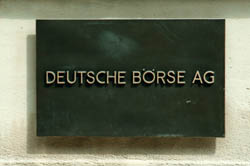 When presenting its final quarterly figures on 3 November, Deutsche Börse announced it would carry out a share buyback programme with a value of around €100 million. The shares are to be repurchased by the end of this year or by the completion of the merger of the Frankfurt market operator and NYSE EuroNext. “We have great confidence in our future earning power and against this background have opted for a share buyback,” said CFO Gregor Pottmeyer.
When presenting its final quarterly figures on 3 November, Deutsche Börse announced it would carry out a share buyback programme with a value of around €100 million. The shares are to be repurchased by the end of this year or by the completion of the merger of the Frankfurt market operator and NYSE EuroNext. “We have great confidence in our future earning power and against this background have opted for a share buyback,” said CFO Gregor Pottmeyer.
GAGFAH was offered 20,480,521 shares in a share buyback offer from early September. Of the offered shares, however, the troubled property group actually bought back only 15,150,564, and now holds 8.37 percent of the capital. GAGFAH had set the price for the announced buyback at €4.95 per share. 2,407,413 shares were offered at a higher price, but the total purchase price for the remaining 18,073,108 shares, €89,461,884.60, exceeded the maximum redemption value of €75 million. The residential real-estate company, dominated by Fortress, had given emphasis to their buyback offer by arguing that they were seeking a withdrawal from the market.
Director's Dealings
| Company | Person | Function | Buy / Sell | Total value in Euro | Number of shares | Datum |
| Allianz | Peter Kossubek | SB | B | 5.895 | 113 | 07.10.2011 |
| Axel Springer | Lothar Lanz | MB | B | 101.880 | 4.000 | 03.-04.10.2011 |
| Bechtle | Schick GmbH | B | 1.780.500 | 75.000 | 17.10.2011 | |
| Deutsche Lufthansa | Stefan Ziegler | SB | B | 24.700 | 2.500 | 21.09.2011 |
| Deutsche Lufthansa | Stephan Gemkow | MB | B | 28.434 | 3.000 | 22.09.2011 |
| DEUTZ | Margarete Haase | MB | B | 10.058 | 2.400 | 30.09.2011 |
| Douglas Holding | Lobelia Beteiligungs GmbH | B | 758.006 | 26.500 | 18.10.2011 | |
| ElringKlinger | Margarete Haase | SB | B | 10.035 | 570 | 30.09.2011 |
| Fraport | Margarete Haase | SB | B | 10.133 | 230 | 30.09.2011 |
| Fraport | Herbert Mai | MB | B | 39.940 | 1.000 | 23.09.2011 |
| GEA Group | Jürg Oleas | MB-Head | V | 398.925 | 22.500 | 26.09.2011 |
| Henkel | Johanna Lehner | B | 305.200 | 8.000 | 23.09.2011 | |
| Henkel | Ulrich Lehner | SB | B | 305.200 | 8.000 | 23.09.2011 |
| K+S | Dr. Thomas Nöcker | MB | B | 35.488 | 1.000 | 04.10.2011 |
| K+S | Klaus Krüger | SB | B | 8.204 | 172 | 13.04.11/30.09.11 |
| Klöckner | Robert J. Koehler | SB | B | 17.800 | 2.000 | 26.09.2011 |
| KRONES | Schawei GmbH | B | 194.510 | 5.000 | 30.09.2011 | |
| KRONES | Ernst Baumann | SB-Head | B | 49.503 | 1.382 | 23.09.2011 |
| Linde | Prof.Dr. Wolfgang Reitzle | MB-Head | V | 412.331 | 4.000 | 27.09.2011 |
| SGL CARBON SE | Theodore H. Breyer | MB | V | 1.894.813 | 47.755 | 30.09.2011 |
| SMA Solar Technology | Dr. Erik Ehrentraut | SB | B | 51.246 | 1.300 | 05.10.2011 |
| STADA Arzneimittel | Eckhard Brüggemann | SB | B | 44.175 | 3.000 | 05.10.2011 |
| Wacker Chemie | Franz-Josef Kortüm | SB | B | 30.872 | 400 | 21.09.2011 |
VIPsight Shareholders
in October
Shares held by capital investment companies:
| By shares | By changes | ||||||
| DAX | 1 | Linde | 30,12 | DAX | 1 | HeidelbergCement | 2,74 |
| 2 | Bayer | 28,48 | 2 | Henkel | 1,79 | ||
| 3 | Infineon | 27,90 | 3 | Fresenius | 1,55 | ||
| 28 | ThyssenKrupp | 8,76 | 28 | BMW | 0,09 | ||
| 29 | Beiersdorf | 7,35 | 29 | BASF | 0,05 | ||
| 30 | Commerzbank | 3,62 | 29 | Infineon | 0,05 | ||
| MDAX | 1 | Rheinmetall | 44,00 | MDAX | 1 | LANXESS | 3,11 |
| 2 | Bilfinger Berger | 41,97 | 2 | GSW Immobilien | 3,02 | ||
| 3 | LANXESS | 41,12 | 3 | Bilfinger Berger | 2,29 | ||
| 48 | Hamburger Hafen und Logistik | 4,60 | 48 | ElringKlinger | -0,72 | ||
| 49 | BayWa | 3,10 | 49 | MTU | -0,73 | ||
| 50 | GSW Immobilien | 3,02 | 50 | Wincor Nixdorf | -0,78 | ||
| TECDAX | 1 | Pfeiffer Vacuum | 49,31 | TECDAX | 1 | 6,35 | |
| 2 | Wirecard | 44,06 | 2 | centrotherm | 1,88 | ||
| 3 | AIXTRON | 40,27 | 3 | JENOPTIK | 1,70 | ||
| 28 | QSC | 6,17 | 28 | Pfeiffer Vacuum | -0,64 | ||
| 29 | Nordex | 5,23 | 29 | AIXTRON | -0,77 | ||
| 29 | Q-Cells | 5,03 | 30 | STRATEC Biomedical | -2,36 |
*Changes from previous month, percent
VIPsight Shareholder ID <click here>
Event Diary
9 November 2011 Klaus Regling (EFSF, CEO), Europa al Emittent. Die neue Finanzierungsgesellschaft [Europe issuer al. The new finance company]
Organizer: CFS; Venue: Campus Westend, Goethe-Universität, Frankfurt am Main; info: www.ifk-cfs.de
9 November 2011 Corporate Finance Business Lunch
Organizer: Commerzbank anlässlich des Erscheinens des WirtschaftsWoche Guide M&A und Corporate Finance [on the occasion of the release of WirtschaftsWoche Guide M & A and Corporate Finance,]; Venue: Frankfurt School; registration: This email address is being protected from spambots. You need JavaScript enabled to view it.
14 - 18 November 2011 Euro Finance Week
Organizer: Maleki Group; Venue: Congress Center Messe Frankfurt; cost: €800; info: www.malekigroup.com
15 November 2011 Private Banking in schwierigen Zeiten [in difficult times]
5th DVFA Wealth Management Symposium; Venue: DVFA-Center, Mainzer Landstraße 37-39, Frankfurt am Main; cost: €345; info: www.dvfa.de
22 November 2011 MiFID 2.0 – neue Anforderungen an Finanzmärkte [new requirements for financial markets]
Organizer: Deutsches Aktien-Institut; Venue: DVFA-Center, Mainzer Landstraße 37-39, Frankfurt am Main; cost: €900; info: +49 69 929150
Reading suggestions
Allgäuer, Jörg E., Larisch, Matthias, Public Relations von Finanzorganisationen [Public Relations of financial organizations]
Gabler Verlag, 369 pp, €59.95, ISBN 978-3-8349-1078-3
The public-relations work of financial organizations differs significantly from that of other companies. The reasons for this lie in the characteristics of the products and services offered, in the economic role and mutual interdependence of financial organizations, in the high regulatory density and in the characteristics of financial reporting. The book offers a practical and at the same time theoretically based foundation for financial organizations’ communications. The authors explain the key areas of financial PR for all target groups (employees, media, shareholders, business partners, policy makers and society), bringing out the strategic and operational characteristics of the communication. Over 500 specific tips, numerous information boxes, illustrations and templates, as well as current industry interviews testify to the high practice content of this compendium.
Böhnke, Werner, and Rolfes, Bernd (eds), Die Banken in ihrer größten Krise – wie geht es weiter? [Banks in their greatest crisis – what’s next?]
Gabler Verlag, 92 pp, €49.95, ISBN 978-3-8349-3383-6
With the financial crisis, the hard -fought competition over conditions continues unabated. German banks are not only in fierce competition with each other; foreign competitors too have the domestic market more intensely in their sights. Internationalization further exacerbates the income and consolidation pressure. Before the progressive changes in the markets and value chains, eyes were so far still closed in many cases. The future distribution of roles in the banking business and the avenues to be explored are being discussed highly controversially both between banks and within banking groups. This book contains ideas and approaches of renowned experts from politics, science and practice.
Tichy, Roland, Schalast, Professor Christoph, Canibol, Hans-Peter, WirtschaftsWoche Guide 2012 M&A & Corporate Finance
Handelsblatt Verlag, 400 pp, €49.90 Euro, ISBN 978-3-775402-45-3
The WirtschaftsWoche Guide 2012 to M & A and Corporate Finance helps German companies, CEOs and general managers with strengthening the capital base of their company to expand operations, outsource or regulate their succession. The Guide provides information on the relevant prospects based in Germany for equity and corporate sales, as well as on lawyers, accountants and consultants who will assist them.















